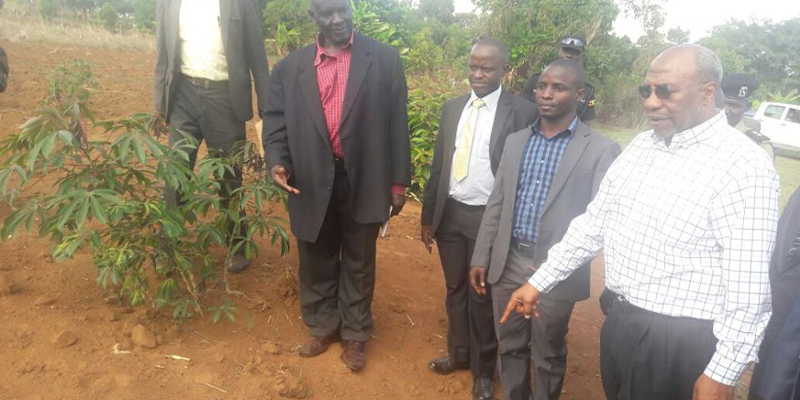News
Hunger: A deeper crisis that threatens to plunge millions into poverty

Prime Minister Dr. Ruhakana Rugunda with leaders in Masaka region inspecting drought-stricken Cassava gardens. Photo by OPM press unit
Millions of people across the country are surviving on a coarse single meal of maize flour, a few leafy vegetables for the lucky ones in order to survive. The dire food situation has been feared for some months following last season’s crop failure that has been complicated further by the prolonged drought conditions experienced in most parts of the country.
Amos Lugoloobi, the MP for Ntenjeru North in Kayunga district, told The Sunrise this week that the great majority of his constituents are surviving on one kilo of Kikosolo (milled but unrefined maize flour), a day.
“Only about 40 percent of the people who have relatives in Kampala and can send them some money or better food are finding life easier. The rest are barely surviving,” said Lugolobi.
The situation remains precarious in the greater Masaka areas of Kalungu, Bukomansimbi and Lwengo.
The Prime Minister Dr. Ruhakana Rugunda was in Kalungu and Bukomansimbi this week to deliver emergency food aid as well as re-assure the hunger-stricken people in the region that the government is concerned about their plight.
He went with some 400 tones of maize flour and 120 tones of beans that was handed to the Chief Administrative Officers and local government officials in both Kalungu and Bukomansimbi for distribution to the most vulnerable in the communities such as the elderly, the children, the sick and the disabled.
The government had warned the population two weeks ago to spare the little food they have due to anticipated harsher conditions, but many people still had nothing left to keep largely because many anticipated rains to be well established by now and thus hoped to have food.
According to the past 10-day weather report (Nov 1-10) released by the department of meteorology, most parts of Ankole, Kabale, Mubende, Bunyoyo and Busoga sub-regions received at least a day of rainfall. It’s the northern parts like West Nile, Karamoja where where rains remains elusive.
Although some little rain has been received in a few areas, it has been poorly distributed and has come late after most crops had already died. Besides losing the money they had spent on buying seed and preparing gardens, many have lost income.
For the urban poor, the food shortage has translated into sharp increases in food prices. For example the price of a moderately sized bunch of Matooke has doubled compared to what it was in August and now goes for between Ushs30,000 to Ushs40,000.
Betty Nambooze, the MP for Mukono municipality lamented the fact that most of her constituents have suspended expenses on other vital aspects of their lives such as school fees so that they can be able to buy food.
As the World Bank revealed this week in a report on the effects of extreme weather events on the poor, the drought in Uganda threatens to drive millions of people back into poverty.
The tragedy, it appears, is the lack of concerted national efforts to address the persistent causes and effects of droughts particularly on farmers.
While president Yoweri Museveni was in Luwero region to demonstrate irrigation using small bottles, his wisdom has been dismissed as unrealistic and simply unworkable.
Nambooze has lamented the unyielding discussions to address the problem of droughts and climate change.
“Any smart planner would have seen this problem coming. I remember I raised this issue on the floor of parliament last year and warned that we faced a real danger of famine if we did not invest in granaries,” Nambooze said.
Indeed, a number of people have called for much stricter regulations requiring peasants to have a proportion of their harvests stored. But the government has argued that the Commodity Warehouse System is a better and modern system that allows farmers to participate in the trade.
But the persistent problem of drought which have increased in frequency in recent years largely due to climate change, coupled with a lack of proper food storage systems, high demand for food are forcing farmers to sell off their produce early.
Many insist that Uganda’s agriculture cannot advance if it remains dependent on rainfall alone.
MP Lugoloobi actually warns that if Uganda does not wake up to the reality that meaningful farming is no longer possible without irrigation.
Lugoloobi has actually called on government to develop an irrigation system that will deliver water in bulk to villages across the country for purposes of facilitating irrigation.
“Government needs to establish bulk water delivery systems to villages so as to facilitate food production as well as other programmes such coffee growing,” argues Lugoloobi.
For Hellen Adoa, the Woman MP for Serere district, the answer to food insecurity will come from reviving school gardens.
Adoa argues that schools have a lot of idle land that could be used for producing food to feed not only the children but also the teachers.
But if history is any guide to the future, most of the strong sentiments especially surrounding the need for irrigation will quickly be forgotten the moment it starts to rain, as has been predicted by the meteorologists. But the damage that will have been created will likely linger on for years until God forbid another drought strikes again.
Comments


















